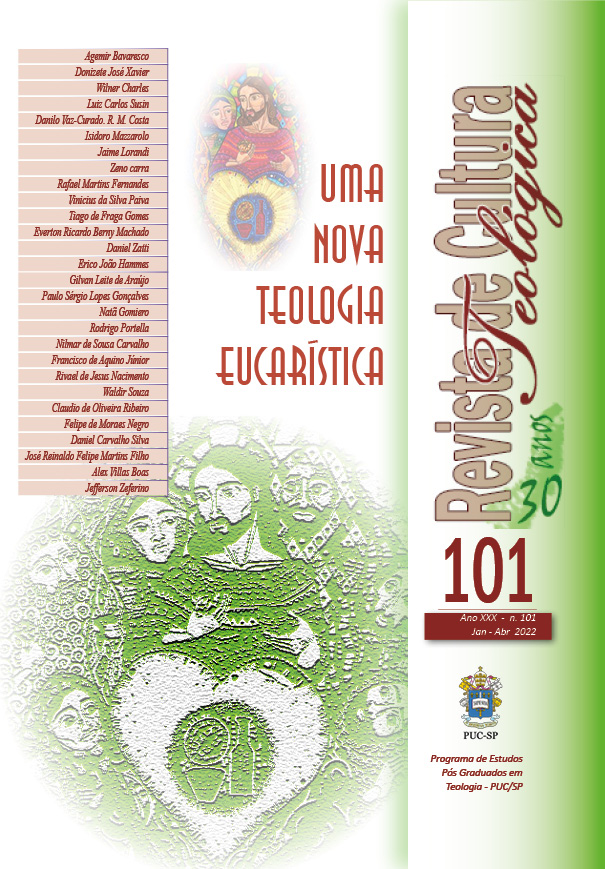A nova teologia eucarística católica de Zeno Carra como colaboração para o discernimento sobre a intercomunhão do cônjuge protestante
DOI:
https://doi.org/10.23925/rct.i101.55701Palavras-chave:
transubstanciação, intercomunhão, ecumenismo, matrimônio interconfessional, eucaristiaResumo
A aproximação ecumênica entre luteranos e católicos-romanos se intensifica na medida em que a teologia sistemática e a teologia pastoral dialogam. O “estado da arte” neste âmbito está na investigação da possibilidade da comunhão eucarística pelo fiél protestante em um matrimônio interconfessional. O presente artigo aborda a temática e apresenta, na crítica do conceito de transubstanciação, utilizado pela teologia católica, uma forma de aproximação da mútua compreensão de Eucaristia por essas duas denominações. A partir do documento gerado pelo Pontifício Conselho para a Promoção da Unidade dos Cristãos (PCPUC) e a Federação Luterana Mundial (FLM), intitulado “Do Conflito à Comunhão”, se analisará historicamente as compreensões católica e luterana sobre a presença eucarística. Serão expostas algumas considerações sobre o subsídio pastoral gerado pelos bispos alemães, chamado de 'ajuda orientadora’ (Handreichung), intitulado Caminhar com Cristo: nas pegadas da unidade, sobre matrimônios interconfessionais e participação comum na Eucaristia. Finalmente abordar o tema a partir do livro Hoc Facite, de Zeno Carra, que apresenta uma crítica à transubstanciação como modelo e apresenta uma proposta original de explicar a presença de Cristo na eucaristia. Esta abordagem pretende aproximar a compreensão luterana e católica da presença real e colaborar para o avanço do diálogo ecumênico.
Referências
ANDREA GRILLO. Nova teologia eucarística: “‘Hoc facite’” e o modelo clássico da presença eucarística. Artigo de Andrea Grillo (parte 2). Disponível em: <http://www.ihu.unisinos.br/577446>. Acesso em: 11 maio 2021a.
ANDREA GRILLO, M. Nova teologia eucarística: “‘Hoc facite’”, linhas sistemáticas do novo modelo. Artigo de Andrea Grillo (última parte). Disponível em: <http://www.ihu.unisinos.br/578069>. Acesso em: 21 maio 2021b.
ANDREA GRILLO, M. Nova teologia eucarística: “‘Hoc facite’”, rumo a um novo modelo de presença eucarística no século XX. Artigo de Andrea Grillo (parte 3). Disponível em: <http://www.ihu.unisinos.br/578018>. Acesso em: 11 maio 2021c.
ANTONIO DALL’OSTO. Ainda sobre a Eucaristia nos casamentos mistos. Disponível em: <http://www.ihu.unisinos.br/78-noticias/579764-ainda-sobre-a-eucaristia-nos-casamentos-mistos>. Acesso em: 21 maio 2021a.
ANTONIO DALL’OSTO. Alemanha: comunhão também aos cônjuges protestantes. Disponível em: <http://www.ihu.unisinos.br/78-noticias/576552-alemanha-comunhao-tambem-aos-conjuges-protestantes>. Acesso em: 19 maio 2021b.
ANTONIO DALL’OSTO, M. Sobre a comunhão ao cônjuge protestante. Disponível em: <http://www.ihu.unisinos.br/188-noticias/noticias-2018/578493-sobre-a-comunhao-ao-conjuge-protestante>. Acesso em: 20 maio 2021c.
CONFERÊNCIA EPISCOPAL ALEMÃ. MitChristusgehen – Der Einheitauf der Spur. . [S.l: s.n.]., 2018
PAULO VI. MysteriumFidei: Sobre o Culto da Sagrada Eucaristia. Roma, 1965. Disponível em: <http://www.vatican.va/content/paul-vi/pt/encyclicals/documents/hf_p-vi_enc_03091965_mysterium.html>. Acesso em: 17 maio 2021.
PONTIFÍCIO CONSELHO PARA A PROMOÇÃO DA UNIDADE DOS CRISTÃOS. O Bispo e a Unidade dos Cristãos: Vademecum Ecumênico. Brasília: CNBB, 2021.
PONTIFÍCIO CONSELHO PARA A PROMOÇÃO DA UNIDADE DOS CRISTÃOS E FEDERAÇÃO LUTERANA MUNDIAL. Do Conflito à Comunhão: Comemoração conjunta Católico-Luterana da Reforma em 2017. [S.l.]: Sinodal; CNBB, 2015.
SESBOÜÉ, B. et al. História dos dogmas - tomo 2: O homem e sua salvação. São Paulo: Loyola, 2003.
ZENO CARRA. Hoc Facite. Studio Teologico-Fondamentale Sulla Presenza Eucaristica di Cristo. Assisi: Citadella Editrice, 2018.
Publicado
Como Citar
Edição
Seção
Licença
Copyright (c) 2022 Revista de Cultura Teológica

Este trabalho está licenciado sob uma licença Creative Commons Attribution-NonCommercial-NoDerivatives 4.0 International License.
Os autores concedem à revista todos os direitos autorais referentes aos trabalhos publicados. Os conceitos emitidos em artigos assinados são de absoluta e exclusiva responsabilidade de seus autores.

